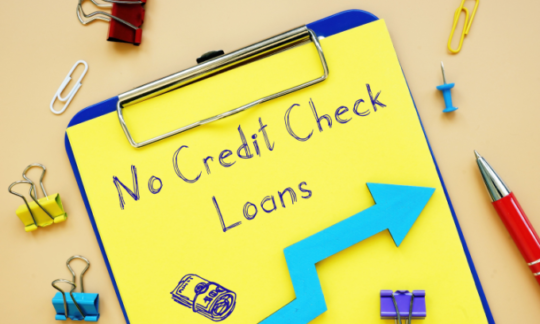No credit check personal loans – what to watch out for
A no credit check personal loan is one where a lender doesn’t take your credit score into account when you apply, but there are some risks to be aware of.

A no credit check personal loan is one where a lender doesn’t take your credit score into account when you apply, but there are some risks to be aware of.
KEY POINTS
- A no credit check loan is generally more expensive than a regular loan.
- No credit check loans can include NILS, guarantor and payday loans. It’s important to note, however, that payday loans often come with high fees.
- The best no credit check loan for you will ultimately depend on your needs and financial circumstances.
A no credit check loan is an option you should carefully consider before proceeding, given these types of loan products can be riskier and more expensive than others. Researching the fees, interest rates, contract terms and risks that can apply is important. If you’re concerned about your credit score, it may also be worth considering whether taking out this type of loan is a good idea at all.
What is a personal loan with no credit check?
In Australia, most traditional personal loans provided by a bank, credit union or other lender require a credit check as part of the application process. This is when a lender assesses how likely you are to repay the loan you’re applying for, based on your credit score, repayment history and financial situation. But in some cases, lenders may offer personal loans with no credit check.
A regular personal loan is quite different to a no credit check personal loan. For one thing, a regular personal loan tends to be somewhat less risky and less costly than one that doesn’t require a credit check. They are also often considered to be cheaper than using a credit card (especially when comparing interest rates), with the added benefit of giving borrowers the discipline of a set repayment schedule.
On the other hand, some personal loans with no credit check can be significantly more expensive, particularly in the case of short-term personal loans (also referred to as payday loans).
What is a personal loan?
A personal loan is a type of loan where you borrow a specific amount of money from a financial institution and then repay the debt with associated interest, typically in equal payments over an agreed term.
Some lenders may allow borrowers the option to make extra repayments, which can be helpful as every dollar you can afford to repay above the required minimum amount can potentially shorten the life and overall cost of the loan.
If you’re in the market for a personal loan, it’s important to compare your options carefully by looking closely at the interest rates on offer, along with all the fees and loan conditions that may apply, before making a decision. You may also want to consider seeking professional financial advice.
Compare Personal Loans with Canstar
The table below displays some of our referral partners’ unsecured personal loan products for a three-year loan of $20,000 in NSW. The products are sorted by Star Rating (highest to lowest) followed by comparison rate (lowest to highest). Consider the Target Market Determination (TMD) before making a purchase decision. Contact the product issuer directly for a copy of the TMD. Use Canstar’s Personal Loans comparison selector to view a wider range of products on Canstar’s database. Canstar may earn a fee for referrals. Read the Comparison Rate Warning.
-
Additional repayments
-
Redraw facility
-
Top-up facility
-
Application fee: $0
-
Annualised fee: $0
-
Loan terms available: 3 years
-
Additional repayments
-
Redraw facility
-
Top-up facility
-
Application fee: $0
-
Annualised fee: $0
-
Loan terms available: 1 year to 7 years
-
Additional repayments
-
Redraw facility
-
Top-up facility
-
Application fee: $0
-
Annualised fee: $0
-
Loan terms available: 3 years to 7 years
-
Additional repayments
-
Redraw facility
-
Top-up facility
-
Application fee: $0
-
Annualised fee: $0
-
Loan terms available: 1 year to 7 years
-
Additional repayments
-
Redraw facility
-
Top-up facility
-
Application fee: $300 up to $1200
-
Annualised fee: $0
-
Loan terms available: 1 year to 7 years
The Car and/or Personal loan products displayed above that are not “Sponsored or Promoted” are sorted as referenced in the introductory text and then alphabetically by company. Canstar may receive a fee for referral of leads from these products. See How We Get Paid for further information.
Canstar is an information provider and in giving you product information Canstar is not making any suggestion or recommendation about a particular product. If you decide to apply for a personal loan, you will deal directly with a financial institution, not with Canstar. Current rates and fees are displayed and may be different to what was rated. Rates and product information should be confirmed with the relevant financial institution. For more information, read our detailed disclosure, important notes and additional information.
*Read the comparison rate warning. The results do not include all providers and may not compare all the features available to you.
Types of personal loans with no credit check
While there are some private lenders that may approve you without a credit check, these types of loans are generally more expensive and riskier than traditional personal loans.
In terms of government-sponsored loans, these tend to be not as expensive, but may have strict application requirements including means-testing, or other eligibility criteria.
Here is a selection of some of the lending options that may be available, and some risks you should keep in mind.
No Interest Loan Scheme (NILS)
The No Interest Loan Scheme (NILS) is an Federal Government supported program run by Good Shepherd Australia, and supported by National Australia Bank (NAB).
The scheme allows eligible borrowers to take out a loan of up to $2,000 without a credit check, to be spent on essential purchases such as household appliances, educational materials, car repairs and some medical and dental services.
The money cannot be taken in cash, nor can it be spent on other items like food, rent or bills, the scheme’s website advises.
There are no credit checks, interest or fees for NILS loans, but you must meet the eligibility criteria. Specifically, according to both the Federal Government’s Moneysmart website and Good Shepherd website, to get a NILS loan you must:
- Have a Health Care Card or Pension Card
- Or earn less than $70,000 (before tax) as a single person, or $100,000 (before tax) if you have a partner or children
- Or have experienced family or domestic violence in the last 10 years
- And have lived at your current address for a minimum of three months
- And be able to show that you can repay the loan.
If you’re struggling financially, it may be worth considering a NILS loan before looking at a more costly option such as a payday loan or other personal loan.
You could start by heading to the NILS website to learn more about these loans, as well as to inquire as to whether you may be eligible.
Payday loans/small amount loans with no credit check
Payday loans, also called a small amount loans, are typically unsecured, not provided by an authorised deposit-taking institution (ADI) such as a bank, have a credit limit of $2,000 or less and a term between 16 days and one year, according to Moneysmart.
Borrowers can often take out one of these loans quickly and with no credit check, but Moneysmart warns that while lenders can’t technically charge interest on these loans, they tend to come with “a lot of fees” attached, which will typically outweigh the interest that would be charged on a more traditional personal loan with a credit check.
In 2019, ASIC intervened to ban short-term credit providers and their associates from charging fees that exceeded prescribed limits for regulated credit. Such fees had been found to cause “significant consumer detriment”.
Even so, the fees on these loans can still exceed the amount borrowed in many cases, and you should seriously consider the terms and conditions of such a product before thinking of applying for one.
For example, Moneysmart reports that these small amount loans generally include establishment fees of 20% of the loan amount and a “monthly service fee” of 4%.
In addition, the National Debt Helpline warns some lenders may also charge late payment fees of $7 per day and default fees of “up to twice the amount you borrowed”.
A payday loan is likely to be significantly more expensive than other types of personal loans, and your credit score could be negatively affected if you are unable to repay it within the tight time frame of a year or less. With this in mind, it’s a good idea to check out all of your alternative options first.
Free, confidential, independent financial counselling is available to support you if you need it, such as from the National Debt Helpline on 1800 007 007 or the Mob Strong Debt Helpline on 1800 808 488 (for Aboriginal and Torres Strait Islander peoples).
Alternatively, you could contact your energy, phone, water or financial services provider to see if you can work out a payment plan suited to your needs.
If you’re on government benefits, you could also get in touch with Services Australia on 136 240 to see if you can receive an advance payment.
Finally, Moneysmart provides some helpful information on how payday loans work and suggests some other options that may help you.
Guarantor personal loans
You may be able to take out a guarantor personal loan without needing to do a credit check. A guarantor personal loan is a type of loan where another individual guarantees your loan, meaning that if you cannot make the required repayments the responsibility will fall to them.
Parents, siblings, family members, partners, friends and other loved ones usually serve as guarantors. Due to the nature of this kind of financial arrangement, it’s important to have an honest conversation with your potential guarantor, so that they know and consent to the potential financial risks involved.
How can I get a better credit score?
Your credit rating can be affected by a range of factors, including:
- How often you have applied for personal loans, credit cards and other forms of credit in the last few years
- The success of those applications
- Your repayment history, including whether you have had any late or missed payments.
If you’re interested in improving your credit score you generally can do so by paying your existing loans, debts and bills on time, checking your credit history for inaccuracies and carefully considering your options before applying for credit.
You can also check your credit score for free with Canstar or via the Canstar App.
Cover image source: Yuriy K/Shutterstock.com
This article was reviewed by our Finance Editor Jessica Pridmore before it was updated, as part of our fact-checking process.

^Read the Comparison Rate Warning.
Try our Personal Loans comparison tool to instantly compare Canstar expert rated options.
^Read the Comparison Rate Warning.











